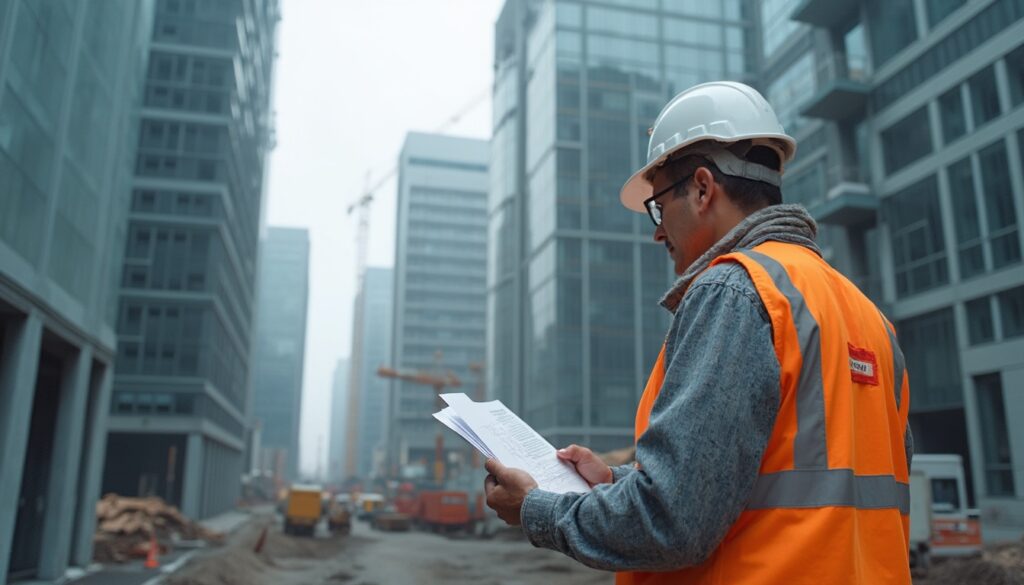Laying the Foundation: What Technical Due Diligence Really Means
Technical due diligence is a systematic analysis and evaluation of the technical risks of a property before a transaction. According to the Royal Institution of Chartered Surveyors (RICS), it is a process where a buyer gathers information about the technical characteristics of the property. The goal is to uncover deficiencies that could affect short-, medium-, or long-term performance. A TDD provides the crucial data for making informed decisions and securing one’s investment. It creates transparency about the actual condition and reveals potential investment bottlenecks before they become a problem. Many underestimate that a TDD not only uncovers risks but also makes potential for value enhancement visible. This process is therefore the foundation for every successful project development and secure transaction in the construction industry.
The Anatomy of the Audit: Core Areas of the TDD Checklist
An effective technical due diligence is based on a comprehensive checklist that covers all critical aspects of a property. Experts focus on several key areas to obtain a complete picture. The results of this examination flow directly into a detailed report with photographic documentation. Here are the central areas of examination that must not be missing in any TDD:
- Structural Substance: Analysis of foundations, load-bearing structures, facades, and roofs for deficiencies or damage.
- Technical Building Equipment (TGA): Testing of heating, ventilation, air conditioning, sanitary, and electrical systems for functionality and lifespan.
- Fire Protection and Safety: Checking compliance with current fire protection regulations and the functionality of safety installations.
- Hazardous Materials and Contaminated Sites: Investigation for environmentally hazardous materials such as asbestos or soil contamination.
- Documentation and Permits: Verification of the completeness of building permits, revision plans, and maintenance records.
- Energy Efficiency: Assessment of the energy condition of the building envelope and technical installations according to the Building Energy Act (GEG).
- Maintenance Backlog (CAPEX): Determination of the short- and medium-term investment costs necessary to rectify deficiencies.
Systematic processing of these points ensures that no costly weaknesses are overlooked, creating the basis for the next steps.
More than just security: The measurable added value of a TDD
Conducting a technical due diligence is not just a protective measure but an investment with direct ROI. It provides a solid foundation for purchase price negotiations and strategic planning. Just identifying deficiencies can improve the negotiating position by 5-15% of the purchase price. A TDD creates a transparent assessment of the condition and thus minimizes unforeseen risks. A central advantage is the transformation of reactive expenditures into proactive, planned investments (CAPEX). Instead of being surprised by deficiencies, measures can be budgeted and integrated into the overall strategy. This leads to a sustainable extension of the property lifecycle. A professional technical examination ensures informed decisions and keeps projects within the planned time and budget. This strategic foresight is crucial to elevate the process from mere examination to digital efficiency.
Increasing Efficiency: The TDD Process in the Digital Age
Traditional TDD processes with paper lists and scattered data on various drives are inefficient and error-prone. Digital tools revolutionize the approach and ensure processing is up to 40% faster. A central platform improves communication between all parties involved and creates a single source of truth. Here’s how a digitally supported TDD process works in practice:
- Set up a digital data room: All relevant property documents are made centrally and accessible to all auditors.
- Mobile data collection on site: Deficiencies and conditions are recorded directly in the checklist via smartphone or tablet, including timestamped photos.
- Assign and track tasks: Identified deficiencies are assigned as tasks directly to responsible professionals or experts.
- Real-time risk assessment: A traffic light system in the software visualizes the status and urgency of risks for management.
- Automated reporting: The final TDD report is generated at the push of a button from the collected data, photos, and assessments.
This structured, digital approach, as provided by a modern construction software minimizes manual effort and ensures seamless, legally secure documentation.
Conclusion: Your Advantage with Valoon
A carefully conducted technical due diligence is indispensable for construction companies and project developers. It is the essential measure for risk minimization, securing investments, and establishing a solid basis for negotiation. The true strength of the TDD, however, is only unleashed when it transitions from a chaotic, manual process to a structured, digital workflow. This is where Valoon comes in. We translate the complexity of TDD into a simple WhatsApp-based process that brings documentation directly from the construction site to the office – without training effort. With Valoon, your technical due diligence is not only legally secure, but also maximally efficient. Secure your projects and avoid costly surprises. Book your free demo now and learn how Valoon simplifies your construction documentation.
More Links
DEKRA provides detailed information on Technical Due Diligence.
Statista provides a statistic on construction defects in single-family and two-family homes in Germany.
BSB e.V. provides the current construction damage report for 2022.
BG BAU informs about risk management in the construction industry.
Federal Ministry of Justice provides the complete text of the Building Code (BauGB).
Federal Ministry of Justice provides the administrative regulation for federal construction administration (VwV Bau).
BBSR publishes a special publication on risk management in construction.
Main Association of the German Construction Industry e.V. presents figures and facts about the construction industry in 2023.
FAQ
What is the difference between technical and legal due diligence?
Technical due diligence (TDD) examines the physical condition of a property, that is to say, structural substance, technology, and deficiencies. Legal due diligence, on the other hand, analyzes all legal aspects such as land registry entries, leases, permits, and other legal obligations.
How long does a technical due diligence take?
The duration of a TDD depends on the scope of the examination and the size of the property. For a single building, the process from commissioning to the final report can take between two and six weeks. For large portfolios, it can take correspondingly longer.
Why is the examination of documentation so important?
Incomplete or faulty documentation is often an indicator of deeper issues. Missing building permits, maintenance logs, or revision plans can lead to legal disputes, costly corrections, and significant project delays.
Can I also use a TDD for smaller projects?
Yes, absolutely. The scope of the TDD can be scaled. Even for smaller construction or purchase projects, a tailored technical examination protects against unpleasant surprises and secures your investment. The principle ‘Certainty comes from checking’ applies to every project size.
How does Valoon specifically help with TDD?
Valoon simplifies data collection during the property inspection. You can record deficiencies, notes, and photos directly via WhatsApp. The information is automatically stored legally secure in the correct project folder and is immediately available to the entire team in the office. This accelerates the process and prevents information loss.








